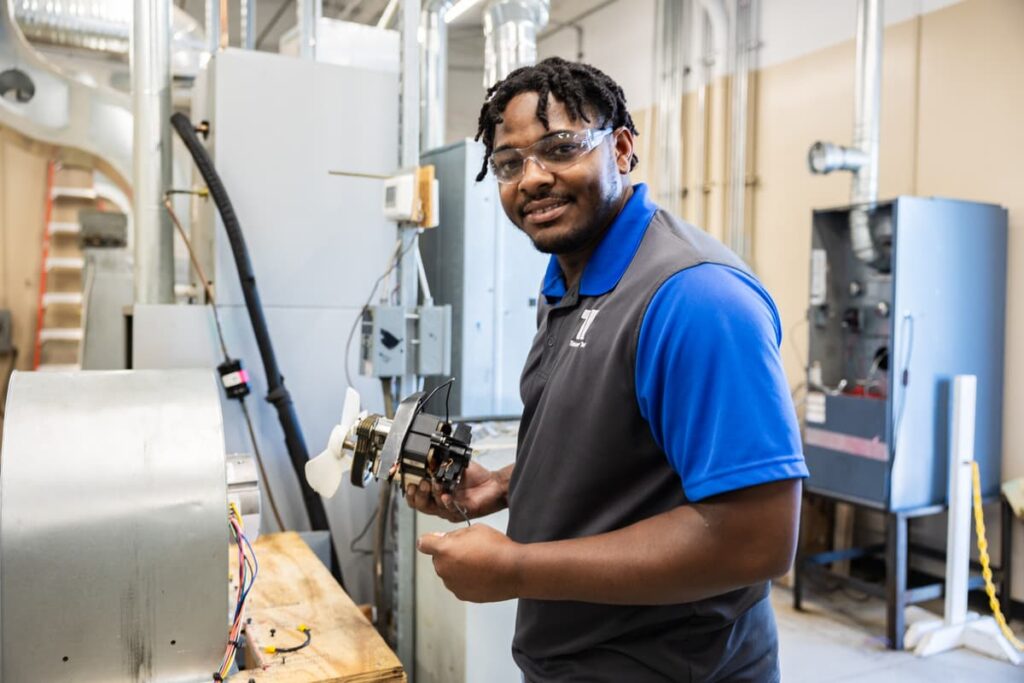If you are ready to start working as an HVAC technician, it is important to complete an HVAC training program, like the one at Tidewater Tech. Our training program can help you shape a successful career in the HVAC industry. With the growing demand for HVAC technicians, now is the time to contact Tidewater Tech and start your career in the HVAC industry.

What is Included in an HVAC Training Program?
It is important to build a comprehensive skill set to become a successful HVAC technician. Some of the topics that are included in the HVAC training program at Tidewater Tech include:
Heating
Heating systems work by generating heat energy and distributing it through ventilation to create a comfortable environment. The process involves the following components:
- Heat Generation: A fuel source (natural gas, propane, oil, or electricity) or renewable energy (solar or geothermal) powers the heat pump system to generate heat.
- Heat Transfer: The heat is transferred to air or water and distributed throughout the structure. Heat exchangers play a crucial role in transferring heat safely and efficiently.
- Thermostat Control: A thermostat monitors indoor temperatures and signals the system to turn on or off to maintain a set temperature.
- Distribution: Heated air, water, or steam is distributed via ducts, pipes, or radiators.
- Exhaust: Combustion-based heating systems include a venting system to safely expel exhaust gases like carbon dioxide and water vapor.
Ventilation
Ventilation in HVAC refers to the process of exchanging indoor and outdoor air to maintain air quality and comfort. Also, ventilation plays an important role in controlling odors, removing pollutants, managing moisture, and ensuring a supply of fresh air. The functions of ventilation include:
- Air Quality Improvement: Removes indoor air contaminants such as dust, allergens, carbon dioxide (CO₂), volatile organic compounds (VOCs), and other pollutants.
- Odor Control: Reduces unpleasant smells from cooking, cleaning agents, or other sources.
- Moisture Control: Prevents excess humidity that can lead to mold growth, structural damage, and discomfort.
- Temperature Regulation: Assists in maintaining consistent and comfortable indoor temperatures by mixing fresh and conditioned air.
- Oxygen Supply: Ensures sufficient oxygen levels by introducing fresh air from the outside.
Air Conditioning
Air conditioning in HVAC refers to the process of cooling, dehumidifying, and filtering air to maintain a comfortable indoor environment, particularly during warm weather. It is an important part of an HVAC system by providing a comfortable environment and improving indoor air quality. The functions of air conditioning include:
- Cooling: Reduces indoor air temperature to a comfortable level.
- Dehumidification: Removes excess moisture from the air to improve comfort and prevent mold growth.
- Air Circulation: Maintains even temperature distribution by circulating cooled air.
- Filtration: Removes dust, pollen, and other pollutants to improve indoor air quality
Why Choose Tidewater Tech’s HVAC Training Program?
There are many reasons to choose Tidewater Tech. In addition to instructor supervised classroom lectures and hands-on training, you also receive a comprehensive safety education and preparation for important certifications that will keep you safe on the job.

Classroom Instruction
Our industry experienced instructors offer direct feedback and guidance to help you master your HVAC skills and build a strong skillset so you can manage any real-world scenarios after graduation.
Hands-on Training
During the HVAC program at Tidewater Tech, you will receive hundreds of hours of hands-on training. This experience is important because it gives you practical training that prepares you for real-world challenges you will face on the job.
Safety Education
At Tidewater Tech, safety is our number one priority. Working in HVAC can come with hazards from electric shock to hazardous refrigerant fumes. We teach you how to safeguard yourself with a comprehensive curriculum and follow it up with hands-on training under the strict guidance of our experienced instructors. It is important to follow safety standards and get certification in both EPA Section 608 and North American Technician Excellence (NATE) certification to show your ability to create a safe work environment for both clients and coworkers.
Certification Preparation
The HVAC training program prepares you for important certification that you will need to complete your tasks as an HVAC technician. Both the EPA Section 608 and NATE certifications are important so you can show employers you can work in a safe environment, keeping customers and coworkers safe in the process. Certification can also improve your job opportunities, career advancement and earning potential.
Why is HVAC Training Important?
There are many reasons why HVAC training is important. Here are a few of the main reasons why:
Entry-Level Experience
Although HVAC technicians are in demand, many employers are looking for entry-level HVAC technicians with experience. How can you get experience if you are entry-level? The good news is that Tidewater Tech offers HVAC training with hundreds of hours of real-world experience that can prepare you for your new career and satisfy the needs of your next employer.
Safety Awareness
Another reason why HVAC training is important is the safety procedures that you learn, under strict supervision of an experienced instructor. Closely supervised training will prepare you for real world scenarios and build your confidence, so you are ready to help clients as you start your career as an HVAC technician.
Industry Certification
The HVAC training helps prepare you for industry certification that many employers require to perform many of the tasks you will be responsible for. For example, handling refrigerants requires an EPA Section 608 certification so you can keep yourself and the client safe while replacing or disposing of hazardous materials.
Understanding Regulations
HVAC systems must comply with various local, state, and federal codes and environmental regulations. HVAC training ensures that you understand building codes, follow environmental laws, and adhere to energy efficiency standards.
Starting Your HVAC Training at Tidewater Tech
Now that you know what is included in an HVAC training program, it is time to learn more about Tidewater Tech. Enjoy the experienced faculty, comprehensive curriculum, and job placement assistance that will get you started as an HVAC technician.Contact us today to learn more about HVAC training.
